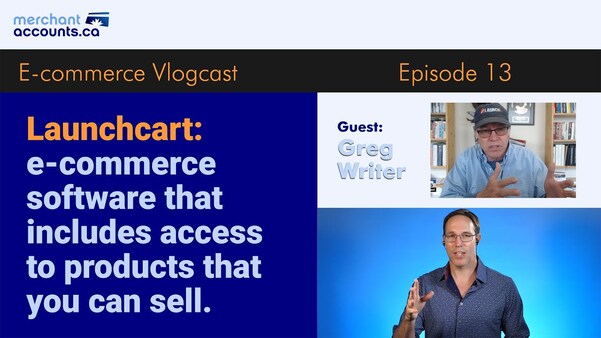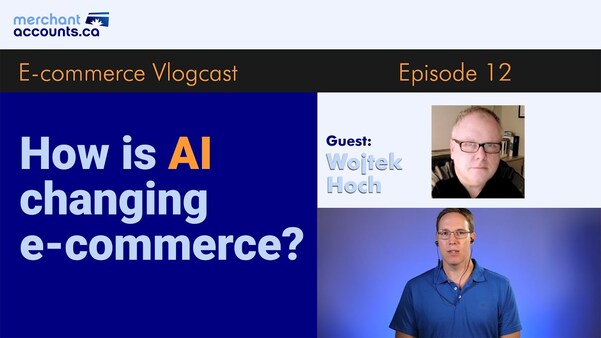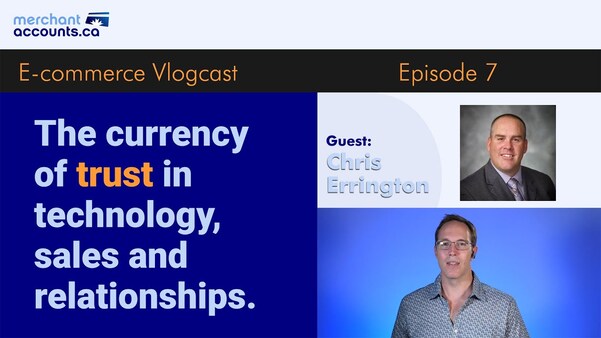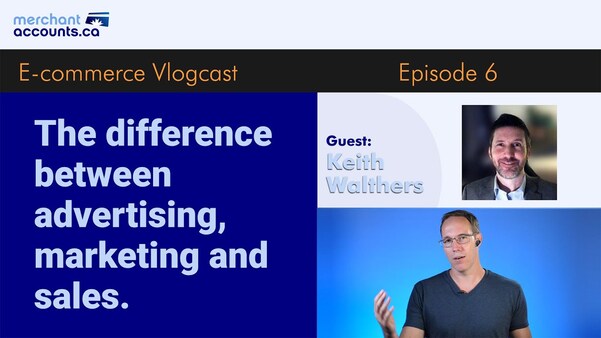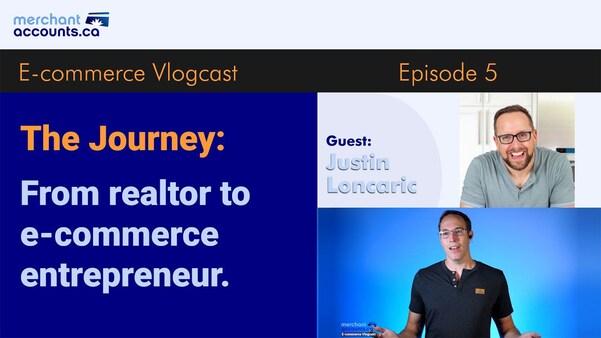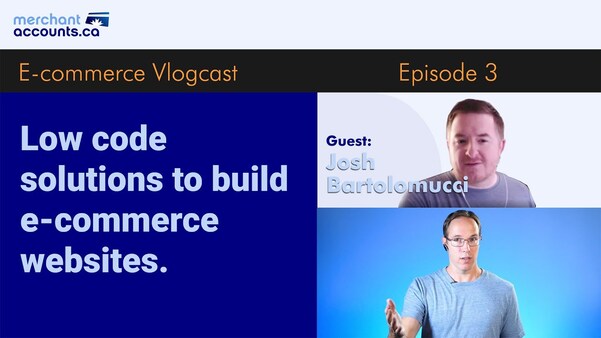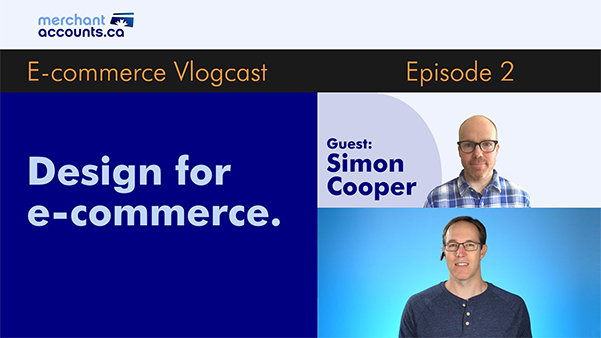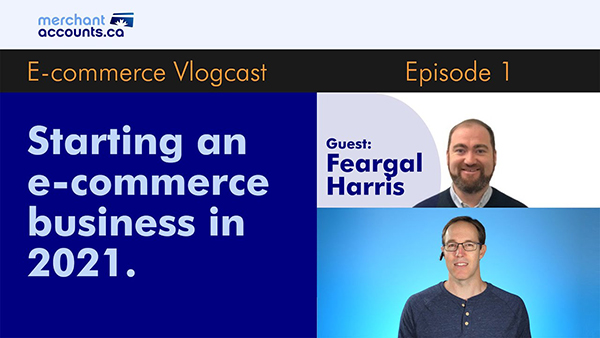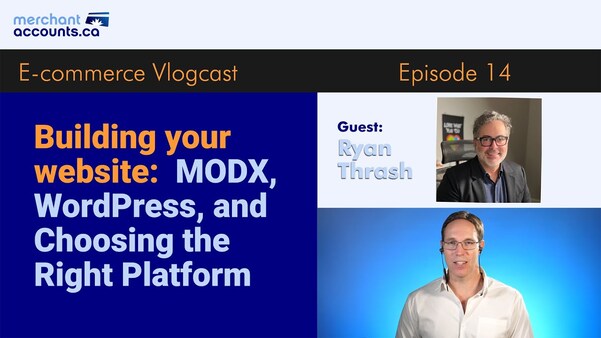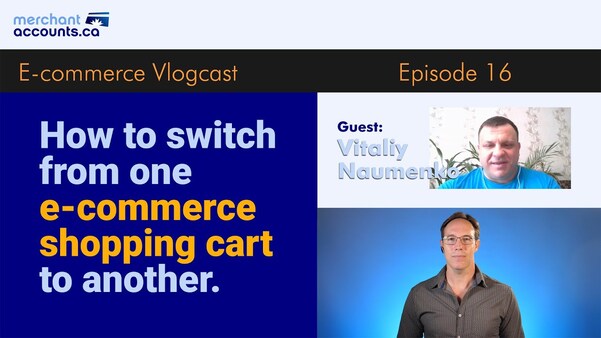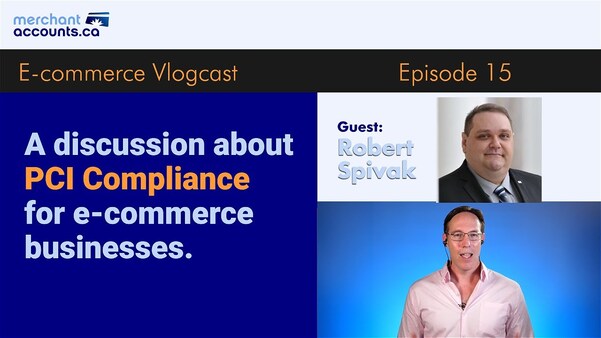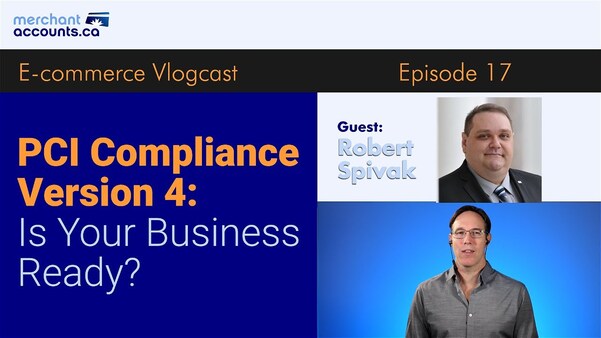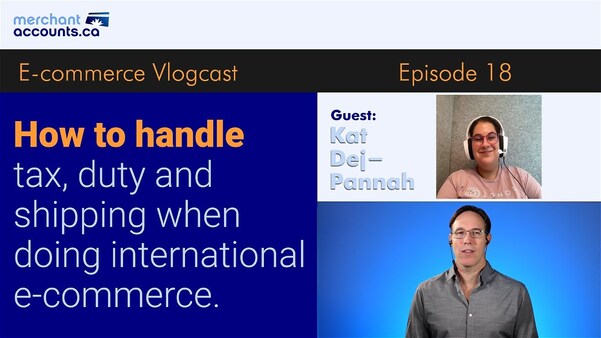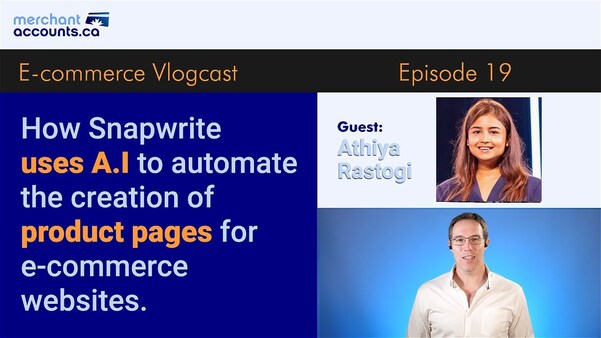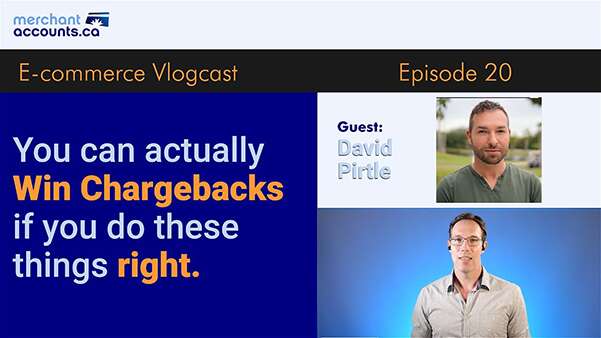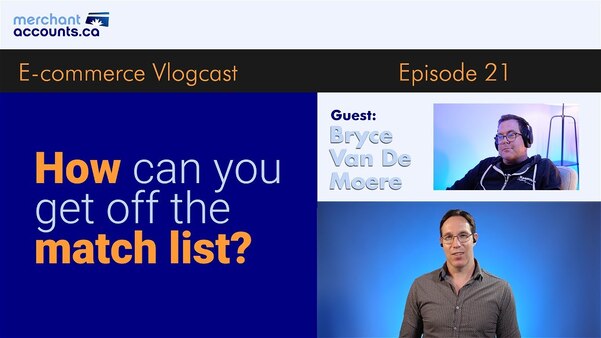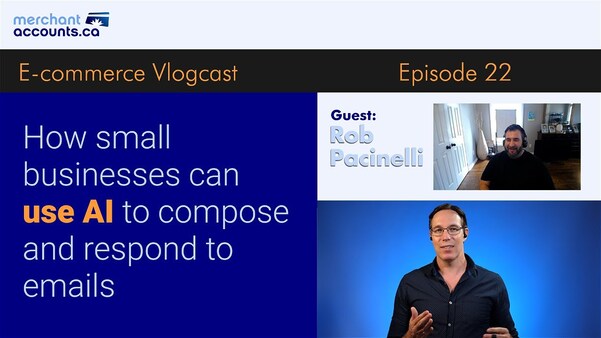August 15, 2022
by David Goodale
How to choose and work with your web development agency for a better e-commerce website.
(Slightly edited from video transcript for greater readability)
David Goodale:
Hello, David here at Merchant-Accounts.ca with another episode of the vlog cast. So I was talking to a client the other day who sells custom lifts for ATVs, jet skis, and large equipment that you might have at home. And the stuff takes up tons of space. It's a really neat product. So you can put these lifts in your garage, but his project has a lot of challenges because these are really large and expensive items. And they're really difficult to ship. It's not like FedEx will take, it has to go less than truckload. And some of the times it's going to rural areas. So it's like this very complicated shipping logic, as well as all the ways it can be customized for weights and things like that. So right now he's quoting every order that comes in over the phone and he's keying them into a virtual terminal.
David Goodale:
And I was talking to him about like doing the full Monty building, the full commerce website. He knows he needs a better solution. He's a little worried about the cost because it's going to be a fair amount of money, but not really what he is worried about is the amount of time it's going to take and the amount of effort to build this. And whether he'll even get the result that he wants in the end. And he's like, well, how do I even go about this? So today I'm talking to Ryan Payne, Ryan's been a digital media executive for over 20 years. He's the founder of lush concepts and has worked with both large brands and smaller businesses over the past two decades. So I'm going to pick Ryan's brain on these problems, Ryan, thanks for joining today.
Ryan Payne:
Happy to be here.
David Goodale:
So I'm just going to start right here. I want to start with who do you hire? I hear these terms, an agency, a web development company designers. What does all that mean?
Ryan Payne:
Yeah, yeah. Those terms all describe essentially bits and pieces of bringing something online. So whether it's a website, it's an app, custom development template design, like there's, there are all these different moving parts. So depending on which term you're using it could mean more on the tech side of things, or more on the creative side of things, but it's all part of the same overall goal of developing and designing something that someone will use to purchase your product or for you to make sales with.
David Goodale:
So an agency can be both technical and design or does it have to be, is it sometimes it's just a design agency? How does that because I'm thinking of people research it's like they don't even know what they need? So that's, I guess what I'm curious about.
Ryan Payne:
Yeah. Some agencies do, just creative and there are development shops or agencies as well that are just development, just creative. Some agencies and companies do both, which is where my company falls into place.
David Goodale:
Okay. So you do the coding and the design element of it.
Ryan Payne:
Yeah. And then just to throw another thing into the mix there's the strategy and the planning and all that stuff, which I'm sure we can, we can get into during our chat here, but yeah, there's all those moving parts.
David Goodale:
So much. We will get to that and I want to get to that. I mean, we could tackle that one. Now we'll get to a short what I was going to ask about. And by the way, that's a great point. But one of the big concerns basically like at a high level is the fear of failure where someone invests a bunch of money into a big project, maybe a web let's talk about a website and it doesn't come together now. It's not going to come together if it doesn't get finished and I've heard of stuff like that happening, or it doesn't work. And what, I mean, it doesn't work. I don't mean like it's a 4 0 4 error. I mean, it doesn't get the results you want, but how often do things like this happen now, obviously not with you at lush concepts, but I mean, in the industry, because I think it's a known thing that this type of, and I think good agencies, a lot of the times I'm guessing fix the problems for bad contractors, you ever have someone do work and then had to have a real contractor to come in and fix it.
David Goodale:
Does that type of stuff happen in your industry there?
Ryan Payne:
Yeah. That's, that's a good point. Like there's a ton of parallels between, something like getting, getting work done in your home, getting work done in your car like it's just service-based work. Right. We inherit a lot of problem projects I guess or things where mm-hmm,
Ryan Payne:
The internet and everything we're talking about have been around for like as long as we've been doing it and a little bit longer, so it used to be that a lot of people needed a brand new website or an app or something like that. It's sort of been around long enough where a lot of people have something but they either need to be updated or they need a refresh or whatever. There's we work with our clients on every kind of end of that spectrum
David Goodale:
This happens every episode, every single time somebody says something let's just blatantly obvious and I wouldn't have thought of it. And the ones already were three minutes in here. I didn't you were right. You don't have to throw the baby out with the bath water. Sometimes it's improvements in maintenance and as web sites or web applications, I guess become increasing increasingly complex. Sometimes you're coming into amend rather than blow it up and begin from ground zero over, over again.
Ryan Payne:
Yeah. Just like the, what we're talking about with getting work done in your home or something, there, there are good companies to work with and there are companies that are going to hold things together with duct tape or, do questionable stuff. So a lot of the time, once, once we inherit something in, in this particular scenario, we'll look, we'll log into the server and or even just take a look at the code and do a bit of an audit just to see what solutions have been used. And there are certain red flags sometimes because we've been doing it long enough that we can take a look and say, oh, this is either very out of date, which it, sometimes that's a bit of an uphill battle. The longer something kind of sits on the shelf then collects dust. Sometimes it's harder to breathe those new updates or add new features to it.
David Goodale:
Oh my gosh, it's true. Oh sorry, go ahead Ryan.
Ryan Payne:
Yeah. I was just going to say yeah, there are so many factors at play and we enjoy what we do. We've been doing it for as long as we have. So we've seen all those different types of scenarios.
David Goodale:
Definitely. You know,
Ryan Payne:
A lot of the time, what we do is after we launch a project, we recommend just a little, a little group, or a little package of draw-down hours. And it, it doesn't need to be much but something that you set aside that whether it's an hour a week or a couple of hours a month, that whether it's plugins, whether it's the server infrastructure, just those sort of things. You have someone that knows how to navigate all that stuff. Just do a bit of a check and, and spend literally like, like an hour a week or something, just making sure that things are up to date. Things are patched. Because there's that inevitable time in the future that you're going to need to make updates. And, and it's that much more of an uphill battle like we said, but there are security patches and updates like that too.
Ryan Payne:
So if you're running a store or anything like that, you're going to want to make sure that all that stuff's up to date as well. And a lot of people from, from what I've seen, small business owners or even mid-size companies try to do all that stuff internally, which if they've got the staff to do it, that's fine. A lot of the time, if, if you're running your own business you're not an expert in that kind of stuff. You might as well just, you might not either do it right. Or you want to focus on your business. You don't want to be patching server you know, plugins and versions of Apache and all that kind of stuff. So it's a, sometimes
David Goodale:
It's
Ryan Payne:
That person as a business owner, like kind of outsourcing and delegating to people who are good at what they do. Like I'm not thankful and glad that I pay my accountant to do my books. Like I'm not good at that. And it would take away from what I'm doing at the end of the day. I wouldn't be able to, get, get what I'm getting all the projects I'm working on, and work on what I'm enjoying. I doubt that most people enjoy doing all the maintenance work and things for their stores or sites or anything like
David Goodale:
That. I mean, true words cannot be spoken, going back to my, like out of high school. Like I loved computers where I was like, well, why don't you get into computers? It's because when you work with computers, people only call you when they're broken. They're fun when they work. So I
Ryan Payne:
That's, and that's why a lot of people won't maintain things because if it's working, it's invisible, if people don't think about it. So so like planning and having this as part of your business operations is a, is a very important thing.
David Goodale:
Definitely. Now I'm going to circle back to something. I know we talked about how not every project is built from scratch, but let's talk about the ones that are, or even maybe where they're not. Okay. So let's, I'm going to use the use case of my client with the lifts business here. So the question I want to ask is, do you have clients come to you and haven't mapped out what they want? Is it your job to give people what they're asking for? Or is it your job to help them understand what they need?
Ryan Payne:
Probably the latter. There's a bit of an overlap, between what they're asking for and what, they might need. Um, so, like I said earlier working with an expert, who's somebody who does this every day they understand the best practices. They understand the latest and greatest technology. This is what they do every day. Just, just like, payment gateways, and all that stuff that you deal with. Like you are, you live and breathe this right? So dealing with someone who understands that stuff properly where I find the most success in projects is someone who knows their business well. And sort of says, here are my general requirements based on what, like what are your recommendations? And then we, and then we kind of work together collaboratively to figure out what the best solution
David Goodale:
Is. That makes total sense. And I often say this, you could give a startup, a million dollars for our website. Anybody that's watched, my V will have heard this before, but my belief is about 950,000 of that million will be wasted because they don't know what their problem is, but, give a million dollars to NASA that could go pretty quickly. They have a lot of problems to figure out for some space shuttle they're working on. So how, how do people go about figuring out what they need if they don't know, because you have to someday I'm going to come talking from the new business owner or not a new business owner, or it could be an existing business moving online, or maybe since everyone has a website now, maybe more monetizing to a more serious e-commerce website. Then, I guess the question that I'm asking here is how does someone go about figuring out what they need to give you criteria that you can work with to even start making helpful suggestions to them?
Ryan Payne:
Well, one of the great things about how mature the industry is these days is that there are a lot of really great examples of people who are doing things well. You can look at the peak and the pinnacle of whether it's Amazon, whether it's like your favorite Shopify site that you, buy things on all the, all the time, or whatever. There's a ton of e-commerce sites and just websites that do things well. So using those as a bit of an example of best practices, you can, you can kind of look at things through that lens and say, well, why, why are, why is this site successful? Why do people keep coming back to it? Why do I like this website? Because there's a bit of a balance of putting yourself in the shoes of the consumer and someone who's going to be viewing what you're putting out there and also like the business owner, like whatever solution you're, you're putting forward.
Ryan Payne:
It's gotta both be useful and kind of quick and easy for the customer, but also on the flip side, from an administrative perspective for you as the business owner as well, like, that's, that's one thing that I think differentiates, and one is, that's one of the main focuses of when we take on projects is like, I'm very entrepreneurial. Like everyone that works within my company we've, we've incubated little prototypes for ourselves just because this is what we love to do. We'll figure out from all angles, like how do we build a solution that works for the people internally, but also the customers?
David Goodale:
So you're thinking of, are, are you saying Ryan, that it shouldn't just be the CEO or the owner that's making all the decisions get feedback from all the employees, because they will all have touch points with the system. Is that what you're saying?
Ryan Payne:
Yeah. That's well, I don't know if that's what I was saying, but it's a, it's a good point. And it, and it's a valuable thing to do because like if you are the marketing manager or you are the fulfillment like an agent or whatever you're seeing the business from a very narrow perspective and what your goals are within a larger business to hit. We do some of our clients are, are resorts and destination travel tourism sort of places. And we're, let's say we're working with a marketing manager, they know like other destination sites. And we love how there are so many photos and there's it's just clean. Like, that's, that's the type of feedback we'll get. But if you speak to other people kinds of key people within your organization, the people who are handling the reservations, for example, the people who are dealing with customer service you might realize that we are contact forms are sent to the wrong email address, or there are little touch points that everybody inevitably has to interact with and getting that full scope of all of those touchpoints is a really useful exercise when trying to think about a refresh or like a rebuild or something like that.
Ryan Payne:
It all factors into it.
David Goodale:
That makes sense. And a little bit of what I'm hearing from you as well as imitation is one of the kindest forms of flattery. So don't go out and reinvent the wheel, look at some of your best competitors and take some of the best things they're doing, because it's a great starting point for what you can do. Yep.
Ryan Payne:
Right? Yeah. And, and you're, you are actually to give yourself credit by going through that exercise, you are reinventing the wheel, but based on bits and pieces of other things that are working well. So you're not, you don't have to blatantly copy things but figure out why something works. Like yeah, like all of the functionality and things like that, like is separate from your brand. Your brand is how you're going to be differentiating yourself and the tone and the look and feel. But if a shopping cart is snappy and the buy flow is really quick, that's the kind of stuff that's just invisible to the user. Like, it's, it just needs to work. So, so that's the type of stuff you want to look to try to mimic
David Goodale:
What a, honestly, a great segue, because here's one of the questions you'll have right on the tail of that. So nobody or very few people are an expert at everything aligned. So just like high level, right? SEO or social media marketing are going to make people aware of the trustworthy site design is going to communicate a message to the user that greets someone when they visit the site co sales copy, that's effective is going to engage the user to make sure that they want to know more. Then a checkout flow is going to bring them into a sales funnel that's hopefully effective. And then an e-commerce engine that allows 'em to purchase a system, to recover click-offs. If people abandon during the checkout flow, those abandon orders and on and on and on. And this is just high level like this is high level. So we're not been drilling in here. There are so many components and I'm a professional at this. I've done it for 20 years. So how does a typical business owner even begin to put this together? So you talked about going to those other sites, but like, if you have someone coming to you and you, about all this glue that has to happen then, in the background, how do you help a non-expert make sure these things get achieved.
Ryan Payne:
Yeah. That's, that's the question right there. Um, we will often when we're taking on a project, we'll establish what the scope is and what we want to achieve because there's, everything can be kind of boiled down to, like, we need to increase sales. We need to optimize our site better for mobile. Like whatever the key revelation was of why they're having the conversation with you, or with me, that's sort of the touchstone and all the different components that you mentioned, the abandoned card, the SEO, those are all just tools, that will help sort of bringing everything together to, to enhance and to kind of meet that objective of what everyone is kind of be going to be working on for the next month too, six months or however long the project is. There's that strategy and kind of planning in the beginning, what is what's everyone here to do? What's the purpose? And as the person who's been doing it for 20 years, or, that that's the subject matter expert we are bringing to the table, all those kinds of tools and what we've seen work in the past. And what we know works.
David Goodale:
That's, that's interesting. I think he also made me realize something else about this, just, just because, you don't see things easily through another person's eyes and you made me realize that I think part of your role is customer education because let's be honest, if you're going to have an e-commerce business, you can't rely on everyone else just to be the expert all the time. So I think you are listening to the answer that you just gave me and also educating your customers so that your customer, from the first day, they met you to one year after the project began and maybe even well after it's finalized there's probably, you're making them aware of things that they, that they need to be aware of to help achieve those calls from the sounds of it.
Ryan Payne:
Yep, exactly. And those are the best partnerships, like where things sometimes get tricky is working with someone who doesn't understand the value that you can, you can bring like we want to position ourselves as a bit of an extension of their business. We're just, the web company, the design company that can, can best execute what those objectives are for the web or mobile or whatever. Um, like my wife and I just yesterday, we had an organization expert come into our place. And you think something like that is so silly, like, okay, we live in our, in our condo and you know, but just optimizing the space, as we've been in, we've been here for, for 12 years, the amount of stuff that you collect in 12 years, we have way more stuff now than we did when we moved in here.
Ryan Payne:
They deal with this every day. So they can look in a shelf and say, oh yeah, we're going to put in, we're going to put in drawers here under the cabinets. And we're going to put in this mechanism that turns around, so you can utilize the space back here. And, and it's stuff like, this is what you do every day. Yes. Like just, have at it, like, let us know what we need. Well, we'll assess what we think we need, and what we don't need. Like we know our space best, organization best. Right. It's like those parallels, like, we'll like, we're not just going to blindly do everything they say we're going to do, we're going to take the recommendations. And through our understanding of our, of our condo, we're going to pick what we think works best for us. And we're probably going to get a really good solution out of it. Hopefully,
David Goodale:
Definitely. First of all, it may never even have occurred to me to do that, I need that service. You're going to have to send me that person's info.
Ryan Payne:
Yeah, yeah, exactly. Yeah. Because, okay, cool. Sometimes the most difficult projects looking, looking throughout my career is like working with someone, especially early, early in my career, you a project would come up and someone would say, we want X, Y, and Z done. And we would do exactly what they said. And then, and then it, it either didn't work properly or it's like, oh, I didn't, I didn't mean this or that. Um, but through, through like experience and just doing this for years and years and years it's almost like I've seen it all, and I'm sure you can probably say the same like there's the odd time that someone will, will present you with a problem. And you're like, huh, this is a bit of a unique one, but it's sort of like this project we did and there are bits and pieces of this. And through bringing a bunch of previous projects together and experiences like, you're like, yeah, we can, we can provide that solution, and here's the best way to do it.
David Goodale:
So, Ryan, I'm going to ask this question, what mistakes can you make when you're working with your agency slash developer slash designer?
Ryan Payne:
Well, I think we might have touched on it earlier and just not allowing or having enough time to plan to get those planning documents and what the overall objectives are ahead of time. So painting a room or doing any of that kind of stuff. The prep work is so critical. So trying to engage and work with a partner without that plan is a tricky thing. And you're not going to be able to optimize the budget and everyone's time is as good as you could unless you had some good planning ahead of time.
David Goodale:
So, Ryan, one of the questions I ask almost all our guests is what is your best secret tip for e-commerce businesses? Now it doesn't just have to be for e-commerce. Sometimes it can be like a general business tip, but what is your best tip or tidbit you could give to business owners that are watching this video?
Ryan Payne:
Well, I'm going to say it again. It's planning, it's getting, getting the objectives set in the beginning and just sticking to them and making everybody accountable to those, to those original objectives and getting everything planned ahead of time.
David Goodale:
That's an excellent tip. Well, Ryan, it was great having you today. One thing that I'm hoping you can do is tell our viewers where they can get in touch with you.
Ryan Payne:
It's pretty simple lush.io is the website. Oh, that's a great domain. Yeah, I jumped on the IO bandwagon early on. It's that input-output sort of a lot of tech companies adopted the .io. Yeah, lush.io is it's got all the case studies and sort of, just what we've been doing and our services and how to get in touch with us.
David Goodale:
What just four viewers benefit. What are your areas of expertise or what is the areas of the main ex what's the main focus of lush?
Ryan Payne:
Well, the way I describe us is that we are a design-led technology studio. In the beginning, we were talking about web developer's design agencies, the word agency in general. I come from a design background but I've also been in tech for a long time. We are sort of that in between. We understand tech and we understand design. So we're not just a bunch of coders and we're not designers who don't understand how something needs to work on a phone, on a big screen TV, on everything. We're a design-led technology studio. Just bringing that creativity and human focus into the design and tech.
David Goodale:
That's great, Ryan and I will honestly say that I got some really interesting insight, and thanks for joining today.
Ryan Payne:
It's been a blast. Thanks for having me. Thanks.
David Goodale:
Ryan.
Need professional guidance?
Contact us for a free one hour consultation.
Can I Help Lower Your Processing Fees?
If you found this content helpful, will you give me the opportunity to quote on your business?
View Rates


